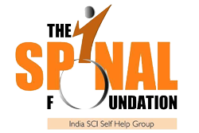The Spinal Foundation was registered in May 2014 as an umbrella organization encompassing all individuals and organizations working for persons with spinal cord injury for many years in their own regions, of course, with the common motive of enhancing the quality of life of persons with spinal cord injury, with a special emphasis on children with SCI and those with upper-level injuries.
India is deficient in quality and affordable rehabilitation centres; less than 10% persons who sustain SCI get quality rehab at affordable costs. There is a need to make replicable holistic rehab models, which could be emulated to make more quality rehab centres. There is also a strong need for a focussed program on right-to-right wheelchair, support for quadriplegics and best practises knowledge base including research.
In the past 6+ years, the impact of TSF has been in the field of networking (25000+ PwSCI), creating a pool of trained peer mentors (250+), reach out to health care professionals, conduct network meets and expand our footprint across the country with our strengths, expertise, partnerships, networking, research and registry.
In an ASCON meet in Kathmandu was born the concept of a World Spinal Cord Injury Day; Dr HS Chhabra, the then President elect, ISCOS, at our behest, took the concept to ISCOS the next year. We all have been observing a variety of event on and around 5th September each year since 2016. This year, TSF held a webinar series on all four Sundays of September on a variety of topics – Best Rehabilitation Practices: The Indian Context, Assistive Technology and Rehab Devices: Possibilities in India, Financial Stability: Saving and Securing Income, Pursuing a Livelihood: Tips and Tricks, Active Living: Fitness, Tourism and Adventure, Pathways to Pursue Sports: Competitive & Recreation in India, Care Giving: Family Perspective, Sexuality & Spinal Cord Injury.
Another great initiative was to set up a CAT club, where aspirants are trained for the IIMs and success has been phenomenal. Recently, Career Launcher has announced 10 scholarships each year for CAT aspirants. We will be extending this service to administrative aspirants too. Proposals are being prepared for the same. Awareness drives have taken us to run marathons, and adventure sports adding to the para-sporting events, and much more. Kotak Mahindra Marathon was exceptional as it was an inclusive marathon organized by PwSCI.
We needed to go beyond ourselves to take these programs forward. Vaidy made a phenomenal contribution in the India Scenario. Shivjeet became our face for global engagements. I took on national programs, Chandra kept hold on finance, Justin looked at partnerships, Kannadasan worked at grassroots programs and Paul did the logos and identities. Shailesh became the face of Pan India Peer Trainer. These are only a few initiatives by PwSCIs, there are many more.
Knowing fully well how a pressure sore can impede rehabilitation, we created a document on bed sores; the document is available on the TSF website. The TSF website should be ready by the year end after a total revamping to make it user friendly and an all-inclusive platform for information about the Spinal Cord Injury Landscape in India. Our partners working in the SCI field have been given a separate space for interaction among each other and to present their activities as well. We tried to reach out to each one of them and they have been enriching us with the phenomenal work they continue to do. Congratulations once again to Ramakrishnan Sir for the recognition he so deserves to get the award of Padma Shree.
Partnerships became our hallmark to multiply our endeavours multi-folds. IIT Madras, with the research- based program called R2D2, created world class affordable wheelchairs and mobility solutions: Neofly, Neobolt, Arise (the Standing Wheelchair). More on this from our CEO Justin V Jesudas.
Covid19 pandemic took us by a storm, a storm which is not relenting even now. We acted fast since we knew that spinal cord injuries affect lung capacities, especially the high-level ones. First guidance from TSF came on 4th March 2020 when the case no in India was 29. In 2 months, we had translations reaching our peers in 18 Indian languages; a visual guide was launched in mid-May. Special training was given to peer mentors across India so as to guide any person with SCI who contracted Covid 19. We were there with them and their families on calls to steer them well through the pandemic.
Adversities give us opportunities. With most rehab centres shut, or unavailable, we devised a peer mentor- based program: Touch FREEDOM in July 2020. Basically, the program involves a person with spinal cord injury needing rehab, to come on video calls one to one with rehab professionals who guide a family member to execute what they convey. The patient may be in one corner of India and the rehab team in different parts on India. We know that nothing can replace an in-house rehabilitation program which is physiatrist driven but until they open up, there was something we could try and do with help from teams of health professionals giving their time for the program. We could also extend this program to old injuries which had never seen rehab! Among them were two PwSCI who had 15 years old injuries.
Under Touch FREEDOM, 233 trainees completed / currently under the program. The best engagement was training for bladder management: 72 completed training. Enroute, we dealt with fractures (03), pain management (10), bedsores (08) and one-time conditions (13) too.
TSF needed to have a long-term vision too, to drive landscape changes in the spinal cord injury space. Best Minds Summits were envisaged as annual events where peers and health care professional could develop strategies, create a registry, promote advocacy, empower persons with spinal cord injuries. Two great meets were conducted and then the pandemic stalled the program for better times.
Our global engagements increased; TSF had multiple opportunities at ASCON, ISSICON, ISCOS. At ISSICON, TSF helped conduct a Consumer Workshop, a panel discussion during the main conference entitled “Demystifying Sports for Indians with Spinal Cord Injury” with three parasports persons preceded by a key note address by Dr Deepa Malik.
Chandra Rama Rao, Shivjeet Singh Raghav and Komal Kamra completed the task for this financial year’s audit and we have received a clear and closure report from the IT Department. Though all expenses thus far have come through collaborations, most have also come from personal money of the founder members. Chandra Rama Rao is now preparing a sustainable model to achieve our targets through application for 80G and through modest memberships.
We have also been able to complete the formalities or the Registrar’s office (an annual affair). We acknowledge the support of T Elango, CEO, The Ganga Foundation in completing the task; P Suresh is taking things further.
The process of compiling a list of all organizations working in the spinal cord injury space and requesting all member organizations to give a 1-page summary of their activities which are being put up on the TSF website as we receive them is still under process.
TSF is also initiating coordination and collaboration with medical associations working in the field of Spinal Cord Injury; this will help us immensely in a variety of ways. Shivjeet (member, EC, Spinal Cord Society) and I are involved in some of their key endeavours.
Justin, our CEO, inducted in November last year, is moving on to take up an assignment with IIT Madras and will continue to work with TSF as a volunteer. His resignation letter and his one-year report were submitted to EC and to the GB. His contributions in the field of registry and research shall continue.
We seek advice and action from all persons and organizations working in the spinal cord injury space. (Document created on December 31, 2021)
(Shared with GB members on January 01, 2022)


 by
by